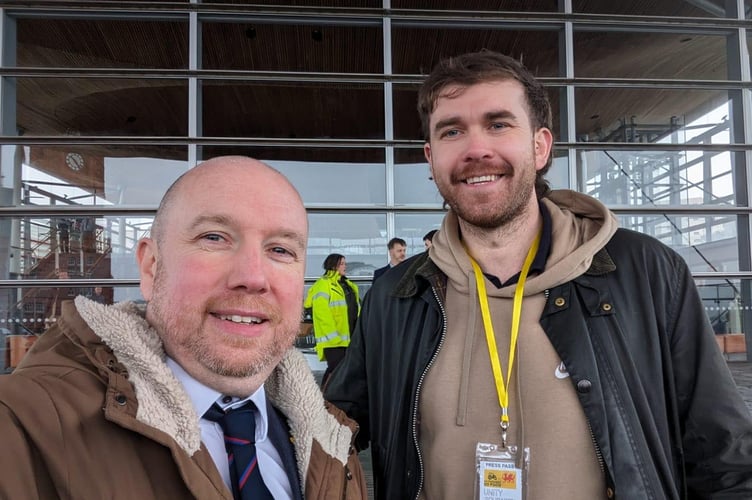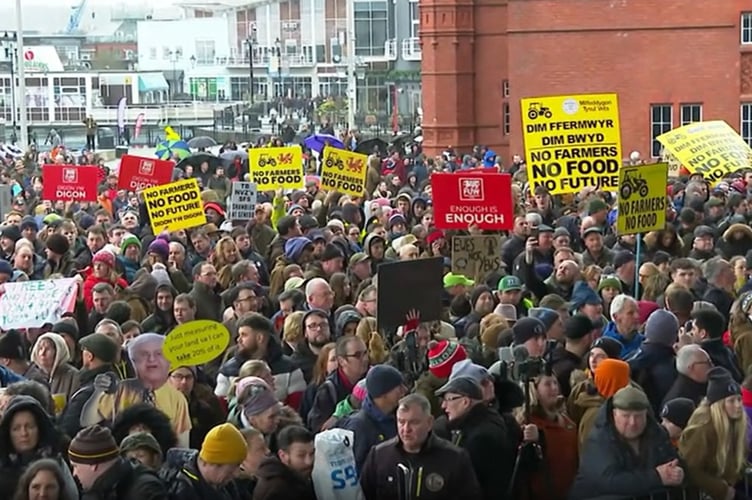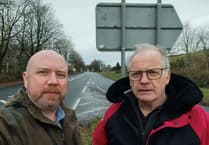The final consultation on a controversial subsidy scheme for Welsh farmers closes on Thursday with tensions remaining high among agricultural workers and the Welsh Government over the future of farming in rural Wales.
Thousands of farmers descended on Cardiff last week to make their voices heard following large-scale protests in Aberystwyth, Carmarthen and Welshpool throughout February.
Farmers are concerned over a number of policies, with the most recent being the Sustainable Farming Scheme, a post-Brexit replacement subsidy.
The scheme would require farmers to commit 10 per cent of agricultural land to be used for trees and 10 per cent for wildlife habitat in order to receive public funding, which the Welsh Government says would go towards tackling the climate crisis.
It has been claimed that this however could lead to as many as 5,500 job losses in the sector and threaten the future of farming in Wales.
This is not however the only issue facing the industry with farmers also concerned over NVZ (nitrate vulnerable zones) regulations and the failure to tackle bovine TB.
Local politicians have backed farmers, with Ben Lake MP and Elin Jones MS saying ‘it’s no surprise that farmers are angry’.

Mabon ap Gwynfor and Liz Saville Roberts in Gwynedd recently held a farming surgery at Dolgellau Mart to discuss concerns from the agricultural community about the sector. They reaffirmed their commitment to do they can to ensure Welsh Labour and Tory UK governments change direction to secure a long-term, viable future for farming in Wales.
Mr ap Gwynfor, who is also farmer, has been lobbying the Welsh Government to ditch what he describes as an ‘unsustainable and undeliverable’ farming scheme that will make farming ‘impossible’ for many in Wales.
Mr ap Gwynfor and Mrs Saville Roberts said: “Farmers in Dwyfor Meirionnydd and across Wales are right to worry about the future of the sector because of the enormous pressure on the industry at the moment. Many of these challenges derive directly from decisions taken by the Tory Westminster and Labour Welsh Governments, be it the damaging effect of Brexit and the proposed Sustainable Farming Scheme, an increase in farming costs or the undermining effect of new trade agreements, NVZ regulations or failing to tackle TB in cattle.
“All of these affect the sector, but when they all come at the same time the cumulative effect is so much worse. Plaid Cymru has consistently stood side by side with our farming communities.
“In Westminster, we have repeatedly argued for increased cost-of-living support for farmers and called for farmhouses to be included in the UK Government’s energy bill support schemes for households.
“We voted against the Australia-New Zealand Trade Bill, which has seen Welsh lamb and beef farmers undercut, and we have consistently argued for the strengthening of the Groceries Supply Code of Practice to support and protect farmers as producers in the food chain.”
Grassroots protests
Farming unions have been in discussions with the Welsh Government for a number of years over the Sustainable Farming Scheme and have raised concerns.
NFU Cymru walked away from talks on the eve of last year’s Royal Welsh Show over concerns over the tree cover element of the scheme.
The protests seen on the streets of Aberystwyth, Wrexham and last week Cardiff, along with meetings in Welshpool and Carmarthen, which attracted thousands, have however been organised online.
No Farmers, No Food campaign group has attracted almost 60,000 followers on X in less than a month.
The protest in Cardiff Bay last week is thought to be the largest ever seen by the Senedd and featured talks from politicians and retired rugby ref Nigel Owens and Gareth Wyn Jones,
A large group of farmers gathered in Aberystwyth in February to protest against the SFS outside the town’s Welsh Government offices.
Plaid Cymru Ceredigion said following the protest ‘it’s no surprise that farmers are angry’.
Commenting the local group said: “Ceredigion farmers, like those across Wales, are right to worry about the future of the sector. Their protest in Aberystwyth was sincere, firm but noble and the numbers reflect the strength of farmers’ feelings due to the challenges facing the agricultural sector in Wales. Many of the challenges arise directly from decisions by the Welsh Government and the Westminster Government.
Be it the Sustainable Farming Scheme, rising farm input costs, the undermining effects of Brexit and new trade agreements, NVZ regulations, failure to tackle TB in cattle - they are all hurting the industry. But when they all come together the cumulative effect is so much worse.
As Ben Lake MP said in the protest on Thursday, “it’s no surprise that farmers are angry” and Elin Jones MS backs that up by promising to take the calls to the Senedd on behalf of the farming community.
“No one knows better than farmers that they have a big part to play in helping tackle the climate crisis. That is why the industry has promised to achieve net zero by 2040 which is earlier than the Welsh Government’s own target. Farmers are ready to meet the challenge, but that transition must be a just transition for those working in agriculture in the same way that it is much sought after for other sectors like the steel industry.”
In a joint statement last week, outgoing First Minister Mark Drakeford and rural affairs minister Lesley Griffiths announced a list of actions they would take following talks with farming leaders.
They included considering an “evidence-based review” of the ways farms can help soak in planet-warming carbon emissions, and carrying out updated economic analysis of the new post-Brexit subsidy scheme.
The statement said: “Farming – and agriculture more widely – plays an important role in Welsh life. It is part of our economy, identity and culture.

‘Significant challenges’
“The Welsh Government is committed to supporting a successful future for Welsh farming. We want to keep Welsh farmers farming, as we tackle the climate and nature emergency.”
“The sector is facing significant challenges as a result of persistently high inflation and energy costs, global instability, high input costs and volatile farmgate prices together with substantial change in the industry.
“We continue to listen carefully to the concerns expressed by farmers and farming unions, including about some of the Welsh Government’s policies. We can today confirm the following action to support the sector.”
Responding to the statement, NFU Cymru president Aled Jones said: “Welsh Government states that they will carry out an updated economic analysis.
“NFU Cymru is absolutely clear that this analysis must take into account the impact of the current SFS proposals on Welsh farming, rural communities and the supply chain. If necessary, the SFS should be paused and delayed until such time as we can be sure that the SFS can deliver the same level of stability to the whole agri-food supply chain and rural Wales as the current support arrangements.”
FUW president Ian Rickman said: “We have made the feeling of our members abundantly clear during our meeting with the Welsh Government. At that meeting we called for a rethink of the current SFS proposals and for closer collaboration of the changes needed on the scheme in conjunction with interested parties and both farming unions.
“However, it is important to distinguish between being economically sustainable and economically resilient. It is also imperative that we fully consider the impacts of any woodland and habitat requirements, even if they don’t go as far as to make farm businesses ‘unviable’.”
Beyond the farm gate
More than 100 different supply chain organisations have attended a meeting to discuss the impact of SFS beyond the farm gate.
Following the meeting, NFU Cymru President Aled Jones said: “The food and farming supply chain is an £8 billion industry in Wales that employs some 233,000 people, Wales’ biggest employer. As a sector we are completely interlinked with each part of the supply chain relying on the other for their viability.
“A productive, progressive and profitable Welsh farming sector is essential to the wider supply chain, farmers spend around £1.4bn annually on products such as feed, fertiliser, veterinary and medicines, farm machinery and contract work. The produce from our farms is processed and sold in retail and food service markets in Wales, across the UK and globally.
“What was clear from our meeting today is that all the businesses present are proud to be part of the Welsh food and farming supply chain, they contribute enormously to the prosperity and well-being of Wales and they share an ambition to further grow the sector in Wales. We have a fantastic food and drink sector in Wales that makes the most of the quality and value of the climate friendly food produced by Welsh farmers. The supply chain companies reliant on those raw materials do not want to see the primary producers undermined.

“There was widespread concern at the impact the proposed SFS could have on the entire supply chain, with Welsh Government’s own impact assessment predicting a £200m hit to farm income and around 11 per cent less livestock in Wales, every business could see the negative consequences this could potentially have for their businesses and employment in the sector.
“Less income on farm will mean less buying power, with a knock-on effect for the agri-supply chain. Less production on farm will impact on our critical mass and could place a question mark over the long-term viability of our processing industry in Wales.
“The future prosperity of the agri-food supply chain is not just an issue for rural Wales, the sector has successful thriving businesses the length and breadth of Wales, located in and employing people from rural and urban Wales. The consequences of a Sustainable Farming Scheme that impacts on Welsh farming’s productive capacity will likely have a similar impact on the whole agri food supply chain.”
Support for STS
Wildlife Trusts Wales and WWF Cymru say it is clear that our current food system isn’t working for farmers, nature, the climate, or even for consumers.
In a joint statement, they said: “The question is how to address the nature and climate crisis whilst ensuring farmers’ livelihoods, and at the same time remembering that without nature, we risk losing the vital role agriculture plays in sustaining our rural economy, our communities and our future. There are hard economic reasons why we should care about nature’s decline. Nature is an asset that underpins all economic activity. But we are rapidly depreciating nature and undermining our economic prospects for the future. Food production is reliant on nature and healthy ecosystems.
“Wildlife Trusts Wales and WWF Cymru believe the Sustainable Farming Scheme is a vital mechanism to help farmers address Wales’s climate and nature crisis since almost 90 per cent of the land is farmed.
“The 10 per cent targets to increase wildlife habitat and tree cover on farms are important elements of the Scheme in addressing both the climate and nature crisis in which farmers have a crucial role to play.
The scheme, if delivered effectively, will help ensure that farming will be better able to cope with a changing climate and more frequent extreme weather events. It sets out a clear pathway for farming to secure a long-term sustainable future in Wales, but only if there is sufficient funding.
“It is vital that farmers are supported to grow sustainably produced food and adopt practices that help restore nature and tackle climate change. But in order to do this, farmers need to be properly rewarded. Without sufficient funding, farmers will simply not be able to undertake the variety of actions needed by the Scheme to help restore nature and make their farms more climate resilient. There is also a need for appropriate funding to invest in training and jobs so that current and future generations of farmers are first in line to prosper from a just transition to more sustainable farming practices.”
Coed Cadw or the Woodland Trust also supports SFS.
“We support the policy to significantly increase tree cover on farms,” said Coed Cadw’s Wales director, Natalie Buttriss.
“We think that it is necessary and desirable, both for farming and the public. This is clearly a big change for farmers and we think it is appropriate to use public funding through the Sustainable Farming Scheme to support farmers in making this change.”




